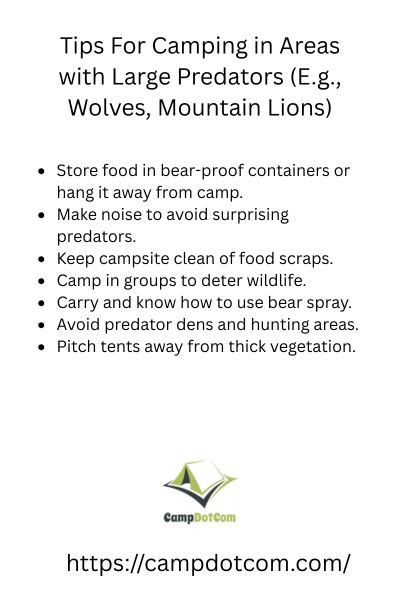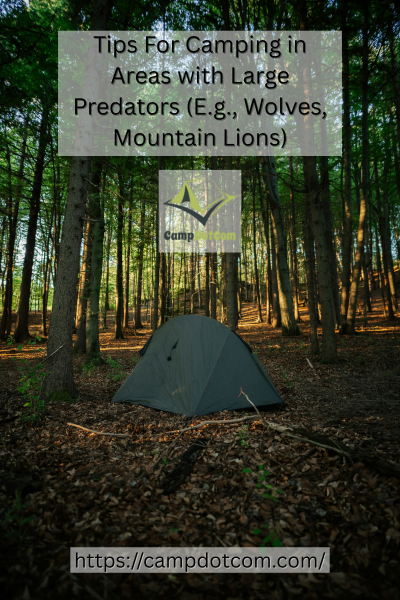Let’s talk about something that often gets overlooked until the last moment, camping safely in areas where large predators like wolves or mountain lions might be around. If you are heading into the wild where the top of the food chain could be close by, it is wise to know how to protect yourself while still making the most of the adventure.
I remember one trip up in the northern Rockies. The night was clear and quiet, with stars so bright they felt close enough to reach out and touch. Then we heard it, a long, distant howl. My friend froze. I froze. It was not our first time in a situation like this, but we knew exactly what that sound meant. Wolves were nearby. We stayed calm, we were ready, and truth be told, we were a little thrilled. There is nothing quite like the reminder that you are not alone in the wilderness.
Read More About Tips for Camping in Areas with Large Predators

Understanding the Wildlife Around You
When it comes to camping in areas with large predators, the best tip I can give you is this: know what you’re walking into. Do a little digging before you go. Are wolves common in the area? Mountain lions? Bears? All of the above?
As an Amazon Associate, I earn from qualifying purchases. Some of the links in this article are affiliate links. This means that, at zero cost to you, I will earn an affiliate commission if you click through the link and finalize a purchase.
You’re not looking to start a fight—you’re just trying to avoid one. Knowing what kind of predators live where you’re camping helps you tailor your setup, food storage, and daily habits accordingly. Predators usually avoid humans, but food smells and noise can change their behavior fast.
More Things to Know About Tips for Camping in Areas with Large Predators

Campsite Setup Can Make or Break Your Trip
One of the biggest tips for camping in areas with large predators (e.g., wolves, mountain lions) is all about your campsite setup. Distance is your friend. Set up your cooking and food storage area at least 100 feet away from your tent. You don’t want to smell like a late-night snack.
Use odor-proof bags or bear canisters. Even if bears aren’t the issue, these predators all have great noses. Mountain lions are more stealthy than bold, but wolves are curious and work in packs. Keep your trash sealed tight, and never bring food into your sleeping bag. I don’t care how cold it is.
Make Yourself Heard (But Not Annoying)
You don’t have to yell into the woods every ten minutes, but making a little noise as you move around is smart. Talk with your camping buddies, play music during the day if you like, and make your presence known. Most predators don’t want a run-in with people.
Funny enough, I once tied a few metal cup clips to my backpack so they’d jingle as I walked. It annoyed my brother to no end, but hey—it worked. We didn’t see a single predator the whole trip. Coincidence? Maybe. But it gave us peace of mind.
Don’t Act Like Prey
One often overlooked but very important tip for camping in areas with large predators is to pay attention to how you move. I mean it. If you see something suspicious in the distance, do not run. Running can trigger a predator’s natural urge to chase, especially with mountain lions. Instead, try to make yourself look bigger, step back slowly, and keep your voice steady and confident.
If you are hiking alone, which is not the best idea in these areas, stay alert and keep looking around. Mountain lions are experts at ambushing. They are quiet and quick. This does not mean you should be scared, but be mindful of your surroundings, especially near cliffs or thick brush.
What To Do If You Encounter One
Let’s hope you never do, but if you find yourself face to face with a predator, here’s what I’ve learned:
Wolves: Stand tall, make noise, don’t turn your back. Most of the time, they’ll retreat.
Mountain lions: Keep eye contact. Don’t crouch or bend down. Make yourself look as large as possible.
Don’t run: I’m saying it again for the folks in the back—don’t run!
I once met a camper who threw a small backpack at a curious mountain lion just to distract it long enough to back away. Wild, right? But it worked. Sometimes it’s about thinking fast and staying calm under pressure.
Master the Art of Safe Camping in Predator Territory
Camping in these wild and beautiful places comes with certain risks, but also unforgettable rewards. The secret is to respect the land you are in and the animals that live there. These tips for camping in areas with large predators such as wolves or mountain lions are not just about keeping you safe, they are also about helping you feel confident so you can fully enjoy your adventure.
And believe me, when you wake up to fresh mountain air, birds singing, and not a raccoon anywhere thanks to your smart setup, you will be glad you planned ahead.
Stay adventurous, but always stay smart.
